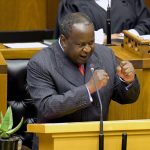SA needs to set a place for everyone at its table
A discussion on the structural reforms that the country needs to lift its economic growth out of the doldrums cannot be the one-sided conversation it currently is.
Author:
7 July 2021

“Structural economic reform” is not a phrase you are likely to have heard in the media lately. But it is what we are currently getting as the government tries to revive the economy.
Despite its obscurity in the mainstream debate, structural reform is the favoured buzz phrase in much of business and important parts of the government. It is why South African Airways now has a majority private shareholding, which is really just a fancy way of saying it has been privatised. It is also why companies are now allowed to produce up to 100MW of power. And it might well be why similar changes may be on the way.
Behind the enthusiasm for structural reform is the idea that this country’s poor economic growth is no accident – it is a product of deep problems in the economy that need to be sorted out before strong growth will become possible. Not surprisingly, business and its allies in the government believe the core structural problem is that the government plays too great a role in the economy and that business must enjoy more freedom. A long-time favourite of structural reform buffs is change to labour laws to reduce the power of workers and unions, although this seems to be on the back burner because the governing party does not want to pick a fight with its union ally, the Congress of South African Trade Unions.
Related article:
Currently, the way structural reform happens is that business decides what it wants changed. It and the media then yell at the government until it does as it is told.
So far, the story sounds familiar: business, loudly cheered on by much of the media, wants its interests looked after and the government, desperate not to offend investors, real and desired, agrees to what it can in the hope of encouraging businesses to kick-start growth. That is certainly a part of the reality but not all of it – or even, perhaps, the most important part.
Business strategists are right that the country needs structural reform, and some changes they want may help the process along.
Historic ills of the economy
Low growth and other economic ills are not a temporary difficulty. They are structural because they are a symptom of how the economy works. Before 1994, South Africa’s economy worked for white people only. The majority government that democracy produced did not try to change that economy – it sought only to ensure that Black people could take part in and benefit from it. Since it was meant only for the few, there is a distinct limit to the number of Black people who can benefit from it.
This continues a core apartheid reality: the economy continues to work only for some people. Whether you can get in on its benefits depends on where you were born and who you are connected to, not whether you are hard-working and smart. And so the country loses out on the talents and energy of the majority who cannot get in, and the pool of people with enough income to buy the goods and services the economy produces is very limited.
Structural reform is needed to change that, and some of what business wants might help. It is hard to make a case for South African Airways as a service to the impoverished and marginalised, most of whom cannot afford even low-cost airlines. We do need new sources of power, although there is a very obvious danger that if the large companies no longer need the national grid, there won’t be enough money to pay for a power utility that efficiently serves the majority.
Related article:
So the problem is not, as some social justice advocates tend to claim, that the country is scrapping arrangements that serve the poor for those that meet the needs of business and the wealthy. What we have now is hardly serving the majority well. It is that the current stress on structural reform is entirely one-sided. Despite some waffle to the contrary, the only concerns raised are those of business, and the sole topic for discussion is whether the government will give it what it wants. The broader question – what must be done to open the economy to everyone’s talents and energies – has dropped off the agenda and all we are left with is an often hysterical conversation which insists that the government will either give business exactly what it wants, or the economy will collapse in a heap.
The power issue gives us a glimpse of what a rounded conversation would look like. The country needs new power sources. But it should be equally clear that if allowing them ensures suburban businesses have all the power they need, but townships, shack settlements and rural areas are served by a system that cannot offer them very much, even fewer talented and hard-working people in these areas will be able to make a contribution.
The discussion should be about how the country allows new suppliers without leaving most people in the cold (literally, at this time of year). It would involve not only businesses and their supporting media, but all citizens’ organisations with an interest in affordable power. And the outcome would be a compromise that creates new power generators but leaves the majority better off.
Agreeing to negotiate
That is what structural reform should mean. It should be a negotiated process in which everyone is at the table and the object of the exercise is to find ways of opening the economy to all that do not leave us all poorer. That may sound naïve, but we have had successful negotiations like these in the past on specific issues, and they are possible now. They are not based on the belief that everyone is on the same side and all we need is to thrash out the details. If that were so, there would be no need for negotiation. Rather, they are based on the realisation that the parties are not on the same side, but they can only get what they need if they concede to the others some of what they require.
This is what reforming the economy was meant to be about. Similar bargains will also be needed in the other areas of life that were placed on the back burner in 1994, when everyone seemed to believe that a political settlement without changes in other areas would produce a country in which all could progress.
Related article:
But it is not what we have now. The current process is one in which business and the media demand and the government complies after a while. Other interests and their views on change are not rejected – they are, rather, simply ignored.
Unless this changes into a process in which all ideas for structural change are on the table – and all of society’s interests that are affected are at that table – the new drift in government policy could well make the problems of the majority worse than they are now. Business is right that the country needs economic change. But a government that is concerned about the interests of most citizens will not allow it to decide alone what that change should be.
This article has been amended to remove an erroneous description of stage 8 loadshedding as the removal of 8MW of energy generation from the national grid. the correct figure is 8 000MW.



